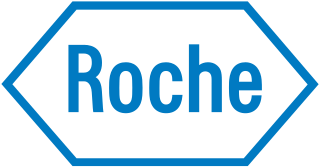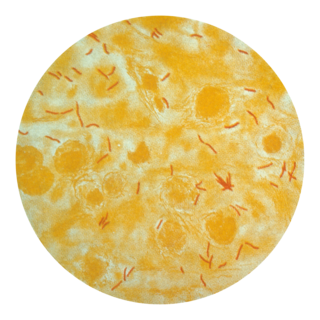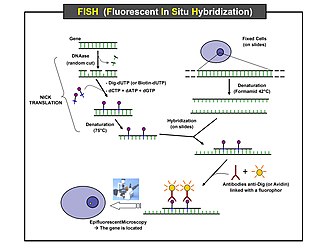
F. Hoffmann-La Roche AG, commonly known as Roche, is a Swiss multinational healthcare company that operates worldwide under two divisions: Pharmaceuticals and Diagnostics. Its holding company, Roche Holding AG, has shares listed on the SIX Swiss Exchange. The company headquarters are located in Basel. Roche is the fifth-largest pharmaceutical company in the world by revenue and the leading provider of cancer treatments globally.

Tuberculosis is diagnosed by finding Mycobacterium tuberculosis bacteria in a clinical specimen taken from the patient. While other investigations may strongly suggest tuberculosis as the diagnosis, they cannot confirm it.
Danaher Corporation is an American globally diversified conglomerate founded by brothers Steven and Mitchell Rales in 1984. Headquartered in Washington, D.C., the company designs, manufactures, and markets medical, industrial, and commercial products and services. It has primarily grown by acquisitions, and historically has tried to maintain a very low public profile. Danaher was one of the first companies in North America to adopt the Kaizen principles to manufacturing, which is a lean manufacturing Japanese philosophy of continuous improvement and elimination of waste.

QIAGEN is a German-founded multinational provider of sample and assay technologies for molecular diagnostics, applied testing, academic and pharmaceutical research. The company operates in more than 35 offices in over 25 countries. QIAGEN N.V., the global corporate headquarter of the QIAGEN group, is located in Venlo, The Netherlands. The main operative headquarters are located in Hilden, Germany. European, American, and Asian regional headquarters are located in respectively Hilden, Germany; Germantown, Maryland, United States; and Shanghai, China. QIAGEN's shares are listed at the NYSE and at the Frankfurt Stock Exchange in the Prime Standard. Thierry Bernard is the company's Chief Executive Officer (CEO).

Tuberculous meningitis, also known as TB meningitis or tubercular meningitis, is a specific type of bacterial meningitis caused by the Mycobacterium tuberculosis infection of the meninges—the system of membranes which envelop the central nervous system.
Illumina, Inc. is an American biotechnology company, headquartered in San Diego, California, and it serves more than 155 countries. Incorporated on April 1, 1998, Illumina develops, manufactures, and markets integrated systems for the analysis of genetic variation and biological function. The company provides a line of products and services that serves the sequencing, genotyping and gene expression, and proteomics markets.
Treatment Action Group (TAG) is a U.S.-based organization that has been prominent within the movement of HIV/AIDS activism. Being formed in 1991, it has possessed the goals of working with worldwide efforts to increase research on treatments for HIV and for deadly co-infections that affect individuals with HIV, such as hepatitis C and tuberculosis, as well as spur on greater access to and efficient usage of already available treatments. The group additionally monitors research on a possible HIV vaccine and on fundamental science aimed at understanding the pathogenesis of HIV/AIDS.
The National Tuberculosis Elimination Programme (NTEP), earlier known as the Revised National Tuberculosis Control Programme (RNTCP), is the Public Health initiative of the Government of India that organizes its anti-Tuberculosis efforts. It functions as a flagship component of the National Health Mission (NHM) and provides technical and managerial leadership to anti-tuberculosis activities in the country. As per the National Strategic Plan 2017–25, the program has a vision of achieving a "TB free India",with a strategies under the broad themes of "Prevent, Detect,Treat and Build pillars for universal coverage and social protection". The program provides, various free of cost, quality tuberculosis diagnosis and treatment services across the country through the government health system.

FIND is a global health non-profit based in Geneva, Switzerland. FIND functions as a product development partnership, engaging in active collaboration with over 150 partners to facilitate the development, evaluation, and implementation of diagnostic tests for poverty-related diseases. The organisation's Geneva headquarters are in Campus Biotech. Country offices are located in New Delhi, India; Cape Town, South Africa; and Hanoi, Viet Nam.
The Xpert MTB/RIF is a cartridge-based nucleic acid amplification test (NAAT) for simultaneous rapid tuberculosis diagnosis and rapid antibiotic sensitivity test. It is an automated diagnostic test that can identify Mycobacterium tuberculosis (MTB) DNA and resistance to rifampicin (RIF). It was co-developed by the laboratory of Professor David Alland at the University of Medicine and Dentistry of New Jersey (UMDNJ), Cepheid Inc. and Foundation for Innovative New Diagnostics, with additional financial support from the US National Institutes of Health (NIH).
DiaSorin is an Italian multinational biotechnology company that produces and markets in vitro diagnostics reagent kits used in immunodiagnostics and molecular diagnostics and since July 2021, it is also active in the Life Science business. The group was founded in 2000 and is headquartered in Saluggia, Italy. Its production is at several plants located in Europe and the United States: Saluggia and Gerenzano (Italy), Dietzenbach (Germany), Stillwater, Minnesota (US), Dartford (UK). Following the acquisition of Luminex, the company acquired five additional production plants located in the United States and in Canada (Toronto). The company is a constituent of the FTSE MIB index.
QuidelOrtho Corporation is a major American manufacturer of diagnostic healthcare products that are sold worldwide.

Exact Sciences Corp. is a molecular diagnostics company based in Madison, Wisconsin specializing in the detection of early stage cancers. The company's initial focus was on the early detection and prevention of colorectal cancer; in 2014 it launched Cologuard, the first stool DNA test for colorectal cancer. Since then Exact Sciences has grown its product portfolio to encompass other screening and precision oncological tests for other types of cancer.

Keertan Dheda MBBCh (Wits), FCP(SA), FCCP, PhD (Lond), FRCP (Lond), born in 1969, is a Professor of Mycobacteriology and Global health at the London School of Hygiene and Tropical Medicine (LSHTM) with an extra-mural joint appointment at the University of Cape Town (UCT), where he is a Professor of Respiratory Medicine.

A coronavirus breathalyzer is a diagnostic medical device enabling the user to test with 90% or greater accuracy the presence of severe acute respiratory syndrome coronavirus 2 in an exhaled breath. As of the first half of 2020, the idea of a practical coronavirus breathalyzer was concomitantly developed by unrelated research groups in Australia, Canada, Finland, Germany, Indonesia, Israel, Netherlands, Poland, Singapore, United Kingdom and USA.
Truenat is a chip-based, point-of-care, rapid molecular test for diagnosis of infectious diseases. The technology is based on the Taqman RTPCR chemistry which can be performed on the portable, battery operated Truelab Real Time micro PCR platform. Truenat is developed and manufactured by Goa-based Molbio Diagnostics Private Limited.

Catharina Boehme is the Assistant Director-General for External Relations and Governance of the World Health Organization. She previously served as WHO Chef de Cabinet, and is known for her work in developing diagnostic tests for diseases such as tuberculosis and for advocating for increased testing for the COVID-19 disease.
The GeneXpert Infinity is an automated cartridge-based nucleic acid amplification test (NAAT) which is able to tell whether the subject fluid contains shreds of the SARS-CoV-2 virus, amongst others. It is manufactured by Cepheid Inc.
Seegene, Inc is a Korean manufacturer of in vitro diagnostic (IVD) products, particularly molecular diagnostics. Its portfolio includes a range of assays and screening products for sepsis, respiratory diseases such as influenza and respiratory syncytial virus, as well as sexually transmitted infections (STIs). It was founded in 2000. In early 2020, it began developing and distributing a range of tests for SARS-CoV-2, the virus that causes COVID-19.















